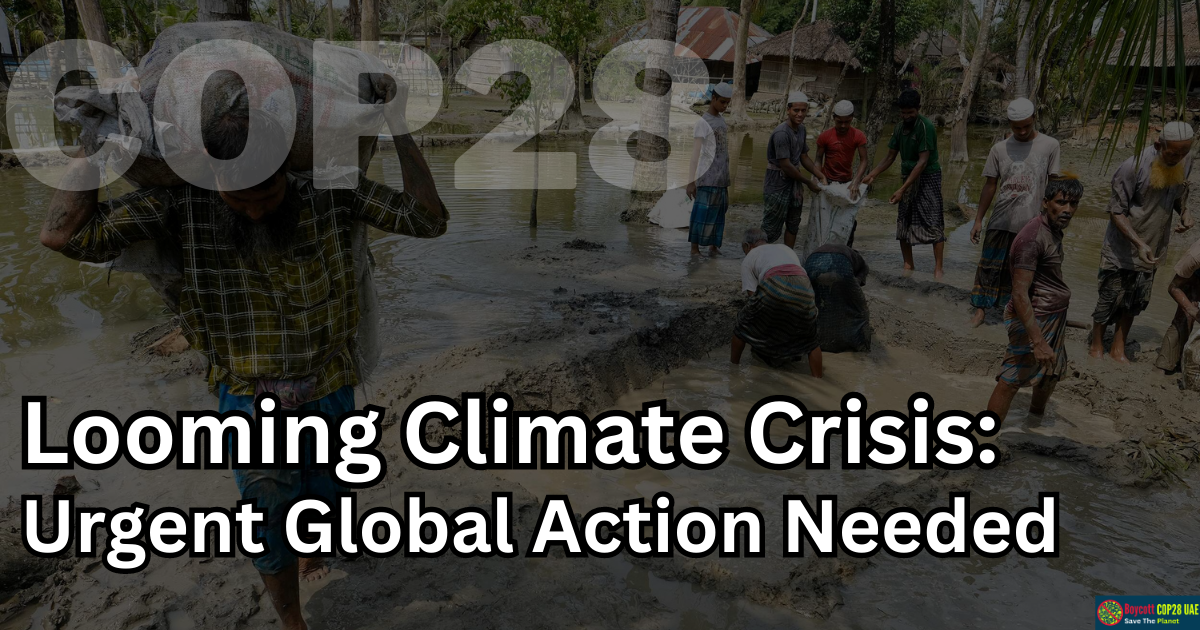As the world braces for the 28th Conference of the Parties to the United Nations Climate Change (COP28), scheduled to convene at Expo City Dubai from November 30 to December 12, a stark reality emerges, the battle against the climate crisis remains an uphill struggle, despite international commitments and resolutions.
The globe is at a pivotal juncture, marked by rising temperatures, intensified natural disasters, and ecological shifts that point to a planet in distress. Scientific consensus underscores that human activities, prominently the combustion of fossil fuels, are at the crux of these unprecedented climatic alterations.
Amidst the lead-up to prior COP conferences, the world had glimpses of hope, with nations pledging emissions cuts, heightened investments in renewable energy, and strategies to safeguard vulnerable regions. However, a retrospective view reveals that mere words and assurances have fallen short in averting the precipice of environmental catastrophe. The lack of legally binding compacts and enforceable mechanisms emerges as a glaring impediment to genuine global action.
Although international agreements like the Paris Accord have succeeded in initiating dialogues, the absence of substantial consequences for treaty breaches renders these commitments somewhat toothless, allowing immediate economic gains to overshadow the far-reaching stability of our environment.
Further complicating matters is the inequitable distribution of responsibility. While the developed world has historically been the primary emitter of greenhouse gases, developing nations justifiably argue for a greater share of the financial and technological load to address the crisis. Regrettably, the pace of resource sharing and technology transfer lags behind, leaving vulnerable nations grappling with the consequences of a predicament they bear a smaller part in crafting.
Vested interests and national politics exacerbate this quandary as pockets of climate change denial and obstructionist tactics continue to hinder progress. Powerful lobbying groups and sectors invested in maintaining the status quo retard the transition to a low-carbon economy.
With these formidable hurdles in view, COP28 must transcend mere rhetoric and chart a pivotal course.
Beyond rhetoric, the global community must take tangible strides toward slashing carbon emissions, fortifying renewable energy infrastructure, and prioritizing adaptive measures to counter the effects of climate shifts. A comprehensive, equitable framework is imperative, one that holds nations accountable for their commitments and lends support to the most susceptible demographics. An equally indispensable role is played by individual actions. Governments, enterprises, and individuals alike must embrace sustainable practices in their daily routines. The journey to combat climate change is collective – from individual carbon footprint reduction to urging businesses to embed environmental stewardship at their core.
Inadequate Climate Commitments Elicit Concerns Over UAE’s COP28 Hosting
While anticipation mounts for the upcoming COP28 hosted by the United Arab Emirates (UAE), apprehensions about the host nation’s commitment to addressing climate concerns cast a shadow over the event. The choice of the UAE as the venue raises questions regarding its alignment with the gravity of the climate crisis and its dependence on fossil fuels. Critics argue that a nation deeply entrenched in the fossil fuel industry lacks the necessary credibility to spearhead discussions aimed at transitioning to a greener global future.
The UAE’s heavy reliance on fossil fuels, particularly oil, and gas, stands in stark contrast to the urgent need for a shift towards cleaner, sustainable energy sources. The country’s economy has long been intertwined with these non-renewable resources, a factor that could potentially hinder its wholehearted dedication to the COP28 agenda. Hosting a conference centered on climate change mitigation and adaptation while maintaining a fossil fuel-heavy economy sends mixed messages, fueling skepticism about the nation’s genuine commitment to the cause.
Furthermore, concerns have arisen regarding the UAE’s record on environmental sustainability and its willingness to prioritize carbon reduction measures. While the country has undertaken certain initiatives to diversify its energy portfolio and invest in renewable technologies, critics argue that these endeavors may fall short of the robust actions required to combat the unfolding climate crisis effectively.
As COP28 draws nearer, global attention intensifies on the UAE’s ability to bridge the gap between its current economic realities and the imperatives of a rapidly changing climate landscape.






